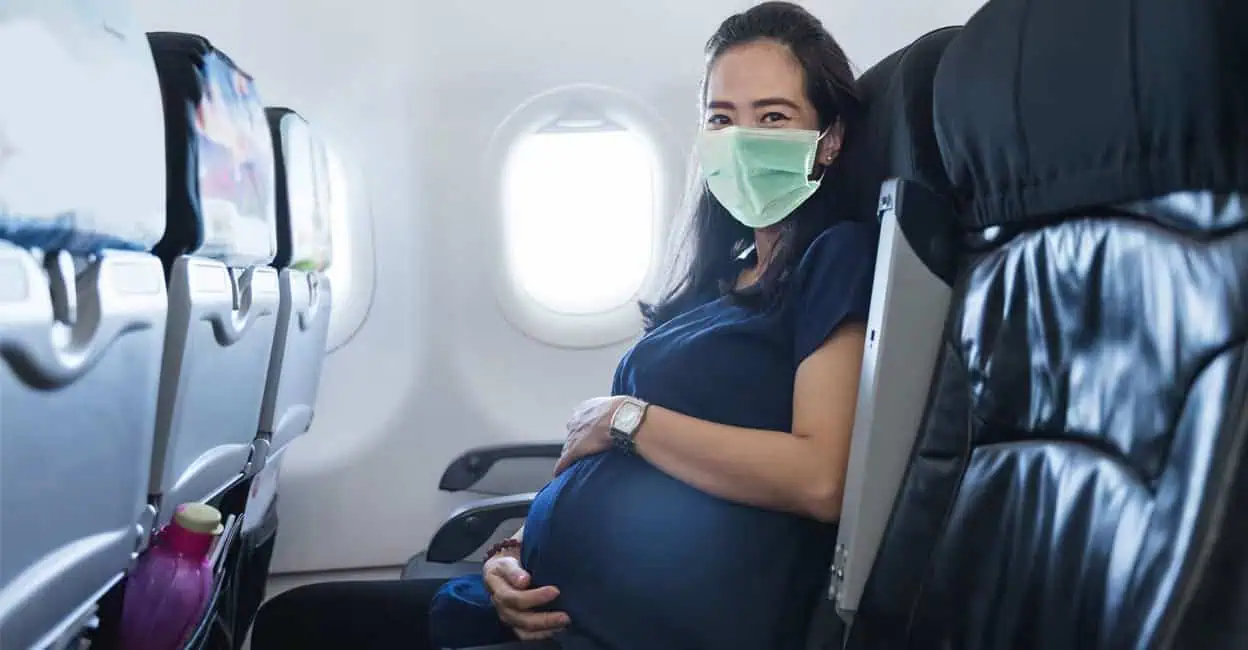Pregnancy is a journey filled with anticipation and preparation, and for many expectant mothers residing in or traveling from the UAE, air travel forms a crucial part of the experience. Flying from the UAE during pregnancy can be critical. Whether it’s flying back home, going on a ‘babymoon’, or a necessary trip, understanding how to manage safe air travel during pregnancy is vital. This comprehensive guide will delve into essential considerations, airline policies, health recommendations, and practical tips to ensure safety and comfort for pregnant fliers from the UAE.

Flying from the UAE During Pregnancy- The Considerable Factors for You
1. Understanding Airline Policies for Pregnant Travelers
Different airlines operating from the UAE have specific policies for expectant mothers:
– Etihad Airways and Emirates Airlines generally allow travel up to 28 weeks without a medical certificate. For travel from 29 weeks up until 36 weeks for single pregnancies and 32 weeks for multiple, a recent medical certificate is necessary stating the passenger’s fitness to fly.
– Air Arabia allows traveling up to the 35th week for single pregnancies, with a medical certificate required from the 29th week, valid for seven days.
– Fly Dubai requires a medical certificate from week 29 to week 36, beyond which travel is not advised.
The general rule across these airlines is that traveling post-36 weeks (single pregnancies) and post-32 weeks (multiple pregnancies) is restricted due to the increased risk of premature labor.
2. Medical Certificate: Your Ticket to Fly
For travel in the final trimester, especially from the 29th week onwards, pregnant women are required to present a medical certificate. This should include:
– Fitness confirmation to fly by a healthcare provider.
– Mention of single or multiple pregnancies.
– Estimated delivery date and number of weeks pregnant.
– Certificate should be issued within three weeks of travel and must be accurately signed and stamped.
Sample Medical Certificate for Flying During Pregnancy
MEDICAL CERTIFICATE FOR PREGNANT TRAVELERS
Patient Information:
- Name: ___________________________________
- Date of Birth: _____________________________
- Passport Number: __________________________
Pregnancy Information:
- Number of Weeks Pregnant: _______________
- Estimated Delivery Date: ___________________
Medical Assessment:
- Single or Multiple Pregnancies: ______________
- Health Evaluation:
- General Health Status: ______________________
- Blood Pressure: ____________________________
- Any Complications (if any): _________________
Fitness to Fly:
- This is to certify that the above-mentioned patient is fit to fly.
- The patient has been assessed for any potential complications and has been deemed fit for air travel.
- Single Pregnancy: Fit to travel until 36 weeks
- Multiple Pregnancy: Fit to travel until 32 weeks
Recommendations:
- Compression Stockings: [ ] Yes [ ] No
- Hydration: Advised to drink plenty of water and avoid caffeine.
- Movement: Advised to move frequently and perform light stretching during the flight.
- Seating: Recommended to book an aisle seat for ease of movement.
Contact Information of Healthcare Provider:
- Name: ___________________________________
- Medical Institution: _______________________
- Address: __________________________________
- Phone Number: ____________________________
- Email Address: ____________________________
Date of Issuance: ___________________________ Valid Until: _______________________________
Signature of Healthcare Provider:
-
- Stamp: _________________________________
This certificate should be issued no more than three weeks prior to the travel date and must be accurately signed and stamped by the healthcare provider. It ensures the airline staff is aware of the passenger’s condition and can cater to any specific needs during the flight.
3. Best Practice Health Considerations
Flying from the UAE during pregnancy, particularly in the last trimester, carries inherent risks such as Deep Vein Thrombosis (DVT) and premature labor. It’s imperative to:
– Consult your healthcare provider before making travel plans.
– Wear compression stockings to minimize the risk of DVT.
– Opt for an aisle seat to ease mobility.
– Stay hydrated and avoid caffeine.
– Carry out light stretching or walking during the flight to encourage blood circulation.
4. Legal and Documentation Needs
Besides medical documents confirming fitness to fly, pregnant travellers should check the entry requirements for their destination country. This includes any visa or documentation that might be needed upon arrival or in case of an unexpected delivery in another country.
5. Travel Insurance is Crucial
Securing travel insurance that specifically covers pregnancy-related conditions and potential delivery while abroad is strongly recommended. Companies like Allianz and AXA offer plans that cater to the needs of pregnant travellers, providing an additional layer of security for unexpected medical expenses.
6. Alternative Travel Options Within the UAE
For those in the later stages of pregnancy who might prefer not to fly, considering a staycation within the UAE offers a safer and relaxing alternative. Luxury resorts across Dubai, Abu Dhabi, and Sharjah provide excellent staycation options with complete amenities to cater to the needs of pregnant women.

Testimonials from Pregnant Travelers Who Opted for a Staycation
Amina R. – Dubai
“As I entered my third trimester, I decided to skip the flights and opted for a staycation at a luxury resort in Dubai. I couldn’t have made a better choice! The resort provided all the comfort and amenities I needed, and the staff were incredibly accommodating. It was stress-free, and I got to relax by the pool without worrying about travel risks.”
3. Hana M. – Sharjah
“Traveling internationally seemed too risky during my last trimester, so I chose a staycation at a resort in Sharjah. It was such a wonderful experience. I didn’t miss out on relaxation and luxury, and the resort had great healthcare facilities in case I needed them. It was a perfect mix of safety and comfort.”
FAQs for Pregnant Flyers
1.When is the safest time to fly during pregnancy?
– The safest time to fly is typically during the second trimester (weeks 14 to 28). During this period, morning sickness has usually subsided, and the risk of miscarriage or premature labor is lower.
2. Are there any dietary considerations during flights?
– Yes, eat light meals and stay hydrated by drinking water while avoiding caffeinated and carbonated drinks. Pack healthy snacks like nuts, dried fruits, and whole-grain crackers to maintain energy levels.
3. What should I do if I experience discomfort during the flight?
– If you experience discomfort, adjust your seat to reduce pressure on your lower back and use a scarf or pillow for support. Move frequently by walking around the cabin or stretching your legs and ankles.
4. Can I travel internationally in the third trimester?
– International travel in the third trimester is generally not advised due to the risk of premature labor. Consult your healthcare provider to discuss risks and necessary precautions.
5. What should I pack in my carry-on bag?
– Pack essential items like medical documents, a travel pillow, blanket, prescribed medications, water, healthy snacks, and entertainment such as books or electronic devices with headphones.
6. Are there specific seats that are better for pregnant travelers?
– Yes, an aisle seat is recommended for easier access to the bathroom and more room to move. It also allows for frequent stretching and changing positions.
Flying from the UAE during pregnancy requires careful planning and adherence to specific airline and health protocols. By understanding these guidelines, preparing appropriate documentation, and considering personal health and comfort, expectant mothers can enjoy a safer and more comfortable journey. Always prioritize consultation with a healthcare provider and consider all available resources, including enhanced airport amenities for a smooth travel experience.





